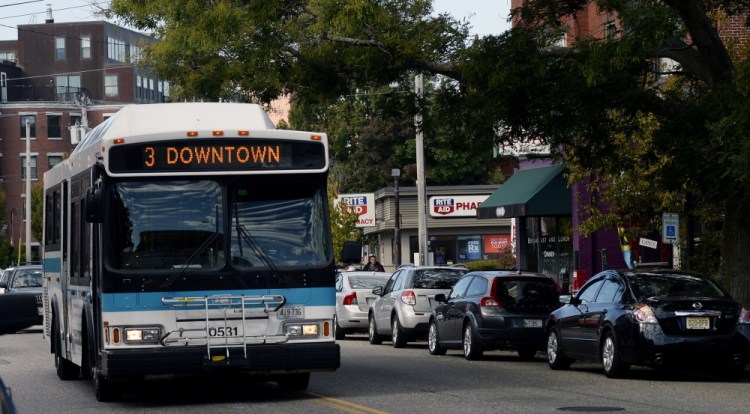Public transit in Maine has a chicken-and-egg problem.
You need population density to produce enough ridership to make frequent service viable. But in places where there is no service, everyone needs a car to get around and development tends to sprawl.
What comes first? Supply or demand? Service or riders?
Greater Portland Metro, the quasi-governmental regional transit authority, has done a good job breaking the stalemate by leveraging relationships with institutions that have transportation needs as a way to make service more convenient to the general public.
Two years ago, Portland Public Schools stopped running buses for high school students, and bought them Metro bus passes instead.
The schools saved money, the students gained flexibility, and Metro riders benefited from more frequent trips and new routes.
NEW CONTRACT
That’s the thinking behind the University of Southern Maine’s new contract with Metro. For the same price it has been paying for a charter shuttle bus service between its Portland and Gorham campuses, USM’s nearly 8,000 students and employees would get bus passes that allow them unlimited access to the Metro system. Metro operates all year, not just the academic year, and its buses run seven days a week.
With increased ridership from USM, Metro can afford to extend frequent service between Portland and Gorham via Westbrook, enabling residents along the way to take a bus to Portland, the Maine Mall and Freeport to shop or work.
It’s a good deal for the university and its students. It’s a good deal for Metro and it’s a great deal for the municipalities of Westbrook and Gorham, which will have reliable public transit for the first time.
It’s not a good deal for Custom Coach and Limousine, the private bus company that has operated the Portland-Gorham shuttle for USM students. Other local motor coach businesses feel the same way, and they’re speaking out, claiming that USM entered a “sweetheart” no-bid contract with a competitor at the taxpayers’ expense.
We can understand why they are sorry to lose USM’s business, but the bus companies don’t have a case.
DIFFERENT SERVICE
USM didn’t just change providers of the same service – it changed services entirely. Metro is the only public transportation system with regional coverage, so there could never be a competitive bidding process for a service that only one entity is capable of providing.
Instead of a point-to-point shuttle, the university is participating in a regional transportation network.
This matters because most USM students don’t live on the Gorham campus, and many have financial hardships. Connecting students with low-cost transportation to employment centers and affordable off-campus housing will advance the university’s mission.
There is also a community benefit from expanded transit that the charter companies can’t duplicate.
People who would never been able to ride the student shuttle will benefit, either by riding Metro themselves, or by having fewer cars on the roads, choking traffic and competing for parking spaces.
This kind of creative cooperation should be a model for other big institutions with transportation needs. USM and Metro have taken a step toward solving southern Maine’s public transit chicken-and-egg problem.
Send questions/comments to the editors.


